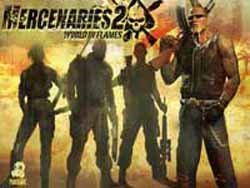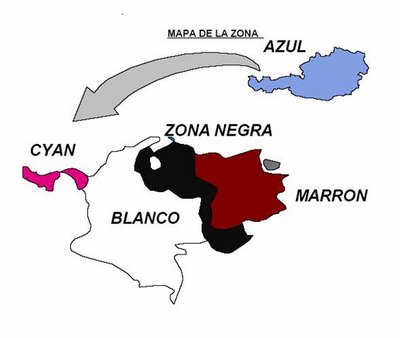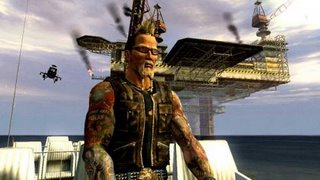Virtual invasions

Venezuela's government recently staged a mock-invasion on its coast, as part of preparations for the US attack which President Hugo Chavez insists is a possibility. Here's an excerpt from one report:
A naval landing craft made landfall on the shores of Western Falcon state carrying troops and over a dozen camouflaged tanks. The "invading" army then took over the massive Paraguana Refining Complex, a key asset of the world's No. 5 crude exporter.
The "occupation" is part of a military exercise to train troops and communities to repel a foreign invader... Venezuela's government has created community organizations called "Local Defense Councils" that would provide support during a potential invasion by hiding weapons deposits, relaying messages or sabotaging water and power services. Quintana said the mock attack involved nine warships, three combat planes and four helicopters -- two of which are Russian-made models Chavez started acquiring after the U.S. thwarted his attempts to acquire American technology.
On Friday, the mock invasion force is scheduled to be repelled by Venezuelans trained to defend the nation's strategic assets including oil terminals, fuel filling stations and tanker trucks.
I fear that if the US does invade Venezuela it will be able to muster more than a dozen or so tanks, Iraq commitments notwithstanding. The Venezuelans may seem paranoid to some unschooled observers, but they know that the US has a long history of intervening in its South American 'backyard' to change governments at the point of a gun. Memories of the CIA-backed 2002 coup attempt are particularly fresh in people's minds. And the US has already staged its own mock-invasion of Venezuela: a year before the abortive coup, US and NATO commanders wargamed a NATO attack on the country from launching pads in Panama and Colombia. Well, technically they were simulating the invasion of a couple of fictional countries by a couple of other fictional countries, but if we look at one of the maps that was used the similarities are pretty obvious:

Now it seems as though a bunch of cybergeeks has decided to give some guidance to the Pentagon. The new video game Mercenaries 2 asks players to help liberate a South American people from a 'power-hungry tyrant' who has 'interfered with our oil supply'. Not too tricky to figure out who they might be referring to, is it? Venezuelan National Assembly members are denouncing the game as an attempt to promote aggression against their country.
I'm not an expert on video games, but would I be wrong in saying that many of them seem these days to take the side of the overdog? How come there are so many games that give their players the job of helping America be world cop, and incidentally shooting lots of Arabs, Hispanics, and blacks, and so few that offer us the chance to strike back at the Empire? Where's Insurgency: the fight to liberate Iraq or Countercoup: fighting reaction on the streets of Caracas?
I remember visiting the legendary Miranda Hot Springs (that's Miranda on the Hauraki Plains, not Miranda in Venezuela) at the fag end of a fourth form camp, and getting to choose between swimming and playing on the spacies machines at the tuck shop beside the pool. No choice, after a week sleeping in tents. As I remember it, my old mate Adrian Price and I left the hoi polloi to their Pac Man, Star Wars, and Karate Kid, and took possession of a game called The Dictator. I still remember, or seem to remember, the blurb that thrilled us when it flashed on the screen everytime we inserted our coins:
The whole country is suffering under the cruel weight of the dictator...the people's only hope is your small band of rebels fighting against all odds high in the remote eastern mountains...you are always outgunned, always outnumbered...good luck!
In case you hadn't guessed, the dictator had slicked back black hair, a chest full of medals, and dark glasses; the rebels all wore olive green uniforms and luxuriant beards. Adrian and I had recently decided, on the basis of one or two books about the Cuban revolution, that we were socialists, and we called our discovery 'The Fidel Castro game'. We played it with a vengeance, until our tuck shop and bus money was exhausted, and smoke and the echoes of grenades and machine gun fire had thoroughly disturbed the Eastern Mountains. I don't think we had enough coins to beat the dictator and liberate the country, though.
What's happened to The Dictator, and where are today's revolutionary video games? Some geek out there must have the answer...


4 Comments:
this is an interesting theme. One of the most wildly popular games over the last five years has been counter-strike, in which one can either play terrorists or counter-terrorists. The neutrality in this is pretty shocking in itself, considering the total post-9-11 dominance of the anti-terrorist doxa.
A really great abandonware PC game from the late 80s, which is freely available on the internet now, but requires emulator software to play, is Hidden Agenda, which is based on being the incoming interim president of a thinly-disguised El Salvador, in which one has to negotiate between leftist, centrist and rightist forces. There are basically two ways to win it: go hard left à la Chavez, inciting US attacks but getting Soviet and Cuban support, or feint left to get a measure of popular support and then swing hard to the right and liquidate the left.
I heard that the game, connected to the Venezuela invasion, has some tie to Bono. I read that at some blog.
Yes. Counterstrike predates 9/11 but it took on new connotations afterwards. If I remember right it had a distinctly 1970s feel, inspired by that other day in September at the Munich Olympics.
I moved to Auckland just before Sept 11, and was relying on internet cafes for email. After the event the cafes were full of guys playing Counterstrike, mostly as the terrorists, and calling themselves 'Osama'.
Scott, there's a piece in last year's Socialist Register asking the same question you do about video games, can't remember who wrote it though. Actually it's mostly focused on action films, making the point that this time around Hollywood has for the most part stayed away from militarist blockbusters, instead going more for historical epics and fantasy and sci-fi escapism. It put that down to the increasing importance of the international market to which Top Gun / Rambo style jingoism did not appeal.
A couple of months ago there was a minor controversy here in Aus over some game called "Getting Up" (or something) that the censors banned. It was about resisting martial law in the US via black street culture, and was banned for allegedly promoting graffiti. Which is pretty funny considering what other games 'promote'.
Mike B
What's up with Austria in that map? Is it supposed to represent Europe?
Post a Comment
<< Home